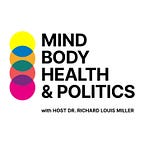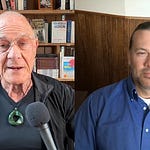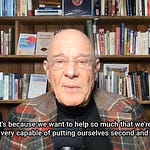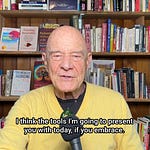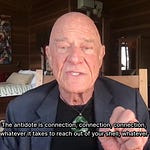Dear Listeners,
I recently had the privilege of engaging in a profound conversation with my dear friend Dr. Mariavittoria Mangini, a renowned expert in the field of psychedelic medicines. Dr. Mangini, with her extensive background as a Family Nurse Midwife and a primary care practitioner alongside Dr. Frank Lucido, brings a wealth of knowledge and clinical experience. Her work with as a founder of the Women’s Visionary Council has significantly contributed to the understanding of psychedelic experiences.
In our discussion, we delved into the complexities surrounding psychedelic medicines, focusing on their side effects, societal implications, and the importance of an informed approach to their use.
“The term 'side effects' can be misleading...” she noted, “‘Side effects' are not inherent to the characteristics of drugs but depend on the context of their use."
This perspective is vital for both medical practitioners and users, emphasizing the need for a comprehensive understanding of these substances.
Mariavittoria and I also discussed the related concept of 'matrix' – the social environment influencing the psychedelic experience. This 'matrix' is crucial in shaping both individual experiences and societal perceptions of psychedelic use. If the surrounding context that you return to after a profound experience does not support you, then you will be at much greater risk of experiencing the after-effects in an adverse way.
Whenever we discuss the risks around psychedelics, or any drugs for that matter, we must make a distinction between relative risk and absolute risk in drug use.
"The relative risk of something can increase significantly, yet the absolute risk may still remain very small," Mariavittoria says.
While we need transparency and open dialogue in the field of psychedelic medicine, we should also be careful to specify whether the risks we uncover are relative or absolute. A certain percent increase in relative risk for an already-uncommon side effect is much less worrisome than the same percentage increase absolute risk.
Finally, our conversation underscored the importance of education and integration. Dr. Mangini emphasized the value of understanding and respecting the cultural history and implications of psychedelic use, a knowledge often accumulated through underground channels.
I invite you to listen to the full podcast episode, and I encourage you to share your own thoughts and experiences regarding psychedelic medicine.
Golden light,
Dr. Richard Louis Miller
Links and Resources
Dr. Richard Miller's books: "Psychedelic Medicine," "Psychedelic Wisdom," "Psychedelic Medicine: End of Life Transitions."
Students for Sensible Drug Policy, 'Just Say Know'.
Show Notes
0:06 - Introduction by Dr. Richard Miller
Overview of the show's mission.
Emphasis on community living as a healthy lifestyle.
Prelude to the interview with Dr. Mariavittoria Mangini.
Context of the interview: Long series on psychedelic medicine and its impact.
4:08 - Dr. Mariavittoria Mangini's Perspective
Support for transparency in psychedelic research.
Discussion of Roland Griffiths' contribution to psychedelic studies.
Insights on the nature and interpretation of medical research and statistics.
7:21 - Discussion on Vaccines and Public Perception
Analogy between psychedelics and vaccines in public perception.
Importance of understanding relative vs. absolute risk in medicine.
10:12 - Discussing the Role of Healthcare Providers
Challenges faced by healthcare providers in educating patients.
Example of antibiotics and patient education.
13:26 - Transition to Psychedelics and After-Effects
Dr. Mancini's experience with people using psychedelics.
Difference between medical and non-medical use of psychedelics.
Concerns regarding unrestricted access to psychedelics.
22:41 - The Impact of Societal Perception on Psychedelic Experiences
Changing societal matrix and its effect on psychedelic experiences.
Historical perspective on societal attitudes towards psychedelics.
28:06 - Importance of Education in Drug Use
Emphasizing honest and comprehensive drug education for young adults.
Impact of cultural and social context on drug use and perception.
32:29 - Discussing the Concept of 'Matrix' in Psychedelic Experiences
Betty Eisner's theory on the role of 'matrix' in psychedelic experiences.
How societal changes affect the context of psychedelic use.
37:37 - The Role of Personal and Social Context in Psychedelic Experiences
Personal anecdotes and historical perspectives on psychedelic research.
The evolving social acceptance and understanding of psychedelics.
44:40 - Post Psychedelic Experiences and Societal Integration
Historical and contemporary views on integrating psychedelic experiences.
The importance of societal support and understanding.
51:30 - Closing Thoughts: Enchantment and Connection with Nature
Discussion on the concept of enchantment and animism.
Emphasizing a deeper connection with the environment and nature.
Seeking Psychedelic Testimonials: The Good, the Bad, and the Ugly.
We are currently looking for first-hand accounts of adverse effects of psychedelics—from ‘bad trips,’ to unwanted physiological complications, to abusive practices by guides, therapists, and shamans.
The interviews from this series will go into a forthcoming book on the topic—perhaps the first book its kind.
Please contact me if you would like to be interviewed. You can also leave us a voice message to share your story. We will keep your information anonymous unless you tell us otherwise.
NOTE: The podcast is always freely available thanks to our paid subscribers. Please share this post to show your support for transparency. The following transcript distills the key points from this show into a condensed form. It is meant as a reference - listen to the full episode for an accurate rendition of the conversation.
Transcript
0:06 - Introduction by Dr. Richard Miller
Dr. Richard Miller 0:06:
Welcome to Mind, Body, Health, and Politics. I'm your host, Dr. Richard Louis Miller. The mission of Mind Body Health and Politics is to enhance your physical and mental well-being and encourage community. I advocate for living in community as I believe it's the healthiest, most effective, and fulfilling way for us humans to live. Before introducing my distinguished guest today, Dr. Maria Vittoria Mangini, I'd like to contextualize this interview. This is a particularly important discussion. Nearly 15 years ago, I started what became the longest-running series on psychedelic medicine ever broadcast in the United States. This was during my time with the National Public Radio affiliate KZYX. My series contributed to the current renaissance in psychedelic medicine and provided a platform for groundbreaking research, like Dr. Roland Griffiths' seminal psilocybin study at Johns Hopkins. Following those interviews, I authored several books, including "Psychedelic Medicine," "Psychedelic Wisdom," and the upcoming "Psychedelic Medicine: End of Life Transitions."
Our current series focuses on the adverse effects of psychedelic medicines. The impetus for this series, and the reason Dr. Maria Vittoria Mangini joins us today, is to address a critical issue. It's always troubled me that pharmaceutical companies often conceal negative results from the public. In my view, this practice is reprehensible. They tend to downplay these results, referring to them as 'side effects,' which implies triviality. However, the adverse effects of many medicines aren't minor; they affect our entire bodies. I prefer to call these 'unwanted complications of medicine,' alternatively known as adverse effects. We, as scientists presenting our findings on psychedelic medicines, owe it to the public to fully disclose any adverse effect or unwanted complication. Our goal is to shift from withholding information to full transparency, enabling the public to make informed decisions about the risks and rewards of these medicines. With this introduction, I now welcome to Mind Body Health and Politics, my dear friend and colleague, Dr. Maria Vittoria Mangini.
4:08 - Dr. Mariavittoria Mangini's Perspective
Mariavittoria Mangini 4:08:
Good morning. I wholeheartedly support the topic you're addressing. I especially appreciate your mention of Roland Griffiths, who, upon learning of his life-limiting illness, used his remaining time to promote transparency regarding the potential of psychedelics. This was based on his role as a principal author of several encouraging research studies that have reignited the conversation about psychedelics.
While I agree with your points, I might frame the discussion slightly differently. In my years teaching pharmacology, I've developed a particular approach to discussing these topics. It's crucial for any prescriber and the public, who use prescription medications, to understand that new medications are initially experienced by a limited group of people. For instance, a new high blood pressure medication might be used by 1,500 to 2,000 people before it becomes widely available. Once a new medication, pill, potion, or procedure enters the realm of broad prescribability, the number of people exposed to it increases significantly. As a result, rarer effects start to emerge.
The term "side effects" can be misleading. Take Benadryl, a common antihistamine, for example. Its effect of causing drowsiness is sometimes labeled a side effect, except when Benadryl is taken specifically to induce sleep. Thus, 'side effects' are not inherent to the characteristics of drugs but depend on the context of their use. Ignoring a possible effect of a medicine doesn't eliminate its existence; these effects are inherent.
This understanding that all drugs can exhibit unexpected effects in larger, diverse populations should be a general principle in pharmacology, rather than focusing solely on the negative potential of psychedelics. It's a predictable outcome when substances are introduced to a broader population with varied characteristics.


